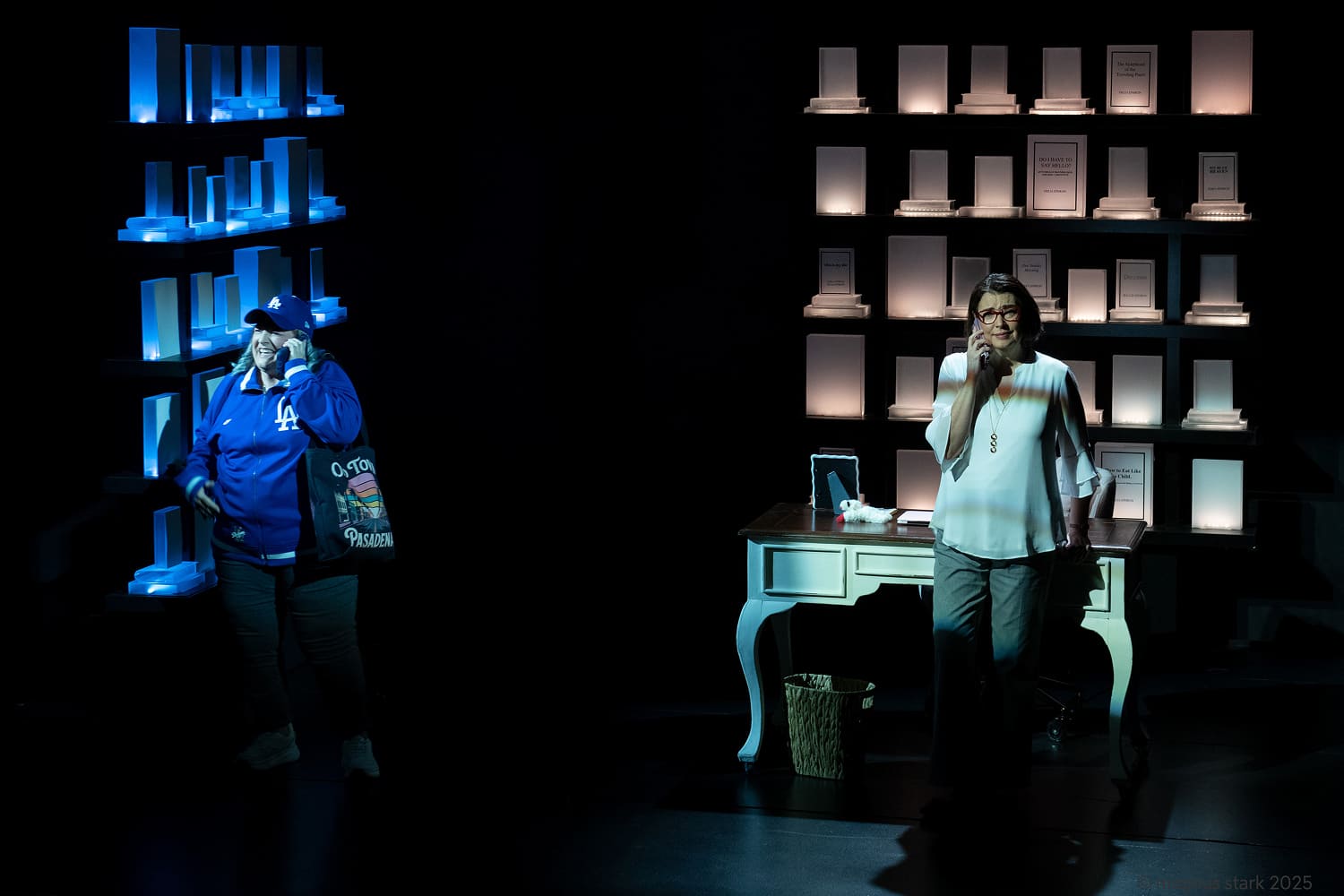
Margot Moreland as one of Delia Ephron's friends and Dalia Aleman as Delia Ephron. (Photo by Magnus Stark Photography)
A bride and groom remain locked in an embrace, swaying gently as reflections of light circle the room. It's the kind of tender moment you could picture unfolding in a wedding hall or some other romantic setting. But a pang of discomfort hits once you realize this wedding is taking place in a hospital room. The bride is fighting for her life against a deadly form of leukemia. And yet one truth emerges: this couple is fully living what the play calls “totality”-choosing not to ruminate about the past or the uncertain future, but instead staying wholly present for themselves and each other.
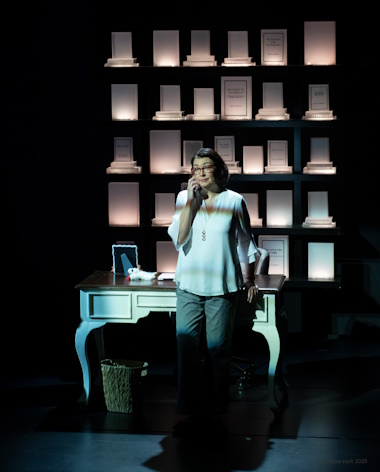
Dalia Aleman as Delia Ephron. (Photo by Magnus Stark Photography)
This scene is among the bittersweet high points of the stage adaptation of bestselling author, screenwriter, film producer, and playwright Delia Ephron's funny and moving memoir, "Left on Tenth." The memoir recounts her own real-life experience with love, loss, illness, and unexpected renewal. Ephron, who survived her illness, adapted her work for the stage. The piece receives a touching, warmly acted production at GableStage in Coral Gables through Sunday, Dec. 21. The running time is less than two hours, without intermission, in GableStage's intimate playing space next to the Biltmore Hotel. Attention to detail brings this tender and compassionate piece, which played on Broadway, to life with care and devotion.
Under Producing Artistic Director Bari Newport's thoughtful direction, the production stars the supremely talented Dalia Aleman as Ephron and Stephen Schetzer as her new husband, Peter. Margot Moreland and Ben Sandomir shine in supporting roles. The production also includes a pair of canine performers: Buddy Dalton as Ephron's beloved dog, Honey, and Winston Benjamin Dalton as Charlie, who enters Ephron's life after Honey dies from cancer. While no trainer is credited, the dogs know exactly what to do.
One reason the adaptation succeeds is that the characters never become talking heads. Ephron blends narration with enacted scenes, creating a lively rhythm that keeps audiences engaged. Even when Delia reads an email she sent to Peter, the play shows his real-time reaction. Moments that might feel static on the page feel immediate and emotionally alive on stage.
The adaptation also succeeds because, while Ephron includes heartbreaking moments of serious illness, she leavens the piece with well-placed humor. The play reminds us of the power of hope and human connection to help us navigate difficult moments. Vivid symbolism enriches Ephron's already powerful language. At one point, Peter describes a solar eclipse, casting the moon as an underdog briefly overtaking the sun-a cosmic longshot that mirrors Ephron's improbable survival.
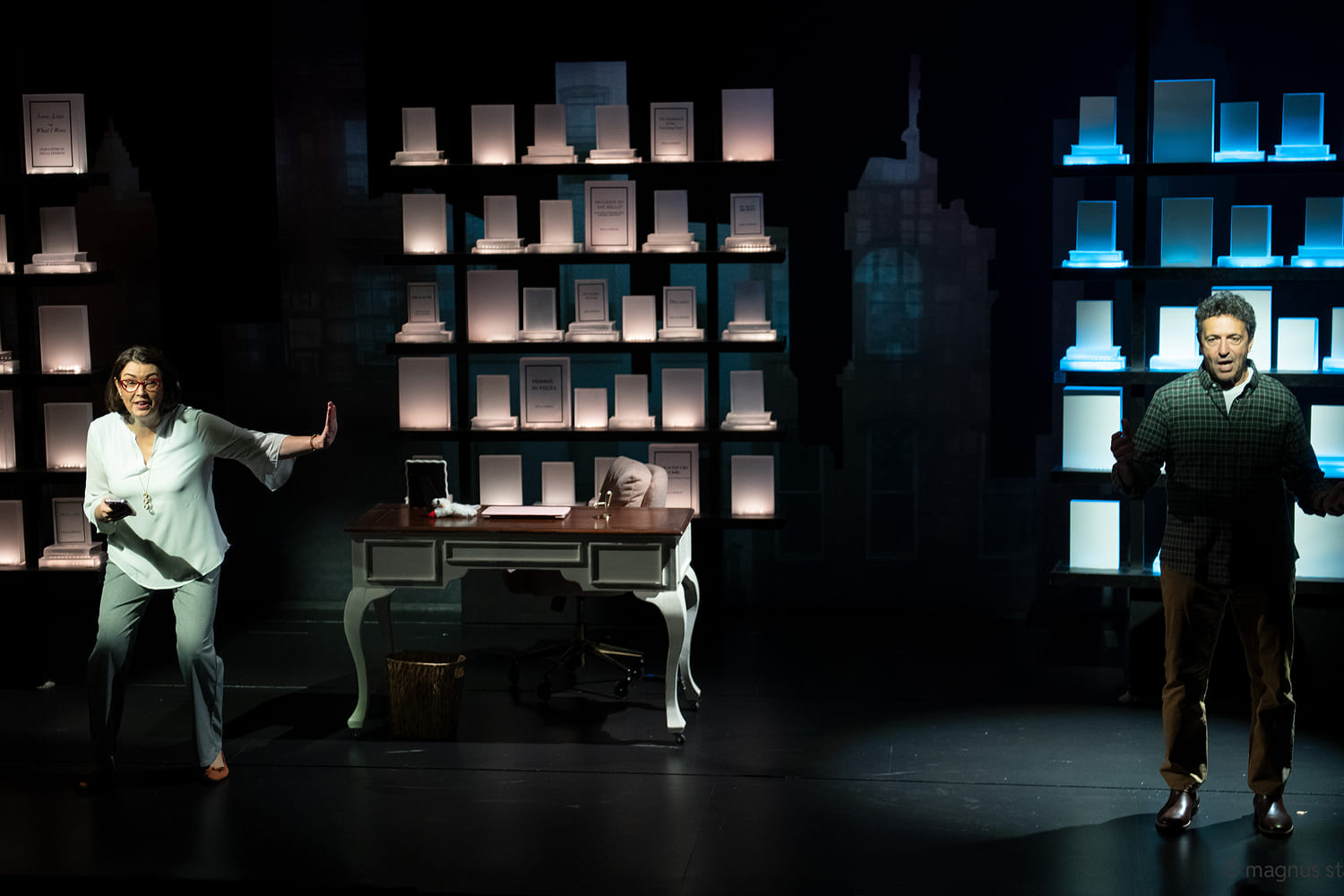
Dalia Aleman as Delia and Stephen Schnetzer as Peter. (Photo by Magnus Stark Photography)
Before the play addresses Ephron's illness, humor reaches us first; comedy can disarm an audience and make them more receptive to serious material. The play begins unexpectedly-no pre-curtain speeches. Instead, we hear music and a Verizon voice message asking the caller to hold until a representative becomes available. Laughter follows immediately, likely because we've all endured frustrating phone-company experiences. When a representative finally answers, Ephron is away from her phone. She rushes to pick up, only to hear a dial tone-the representative hung up. We laugh not at Ephron but because we've been there.
We later learn that Ephron is on the phone with Verizon to cancel her deceased first husband's landline, only for the company to mistakenly disconnect her Internet service, causing long periods of frustration. She chronicled the ordeal in a New York Times op-ed titled “Love and Hate On Hold With Verizon.”
Ephron's first husband, the late playwright and screenwriter Jerome Kass (1937–2015), died of prostate cancer after 37 years of marriage. While Kass does not appear in the play, Ephron-celebrated for "You've Got Mail" and "How to Eat Like a Child"-is vividly alive. So, too, is Peter Rutter, a Jungian psychoanalyst and psychiatrist who contacts her after reading her op-ed. They quickly realize they share much in common, and their meeting feels less like chance than fate.
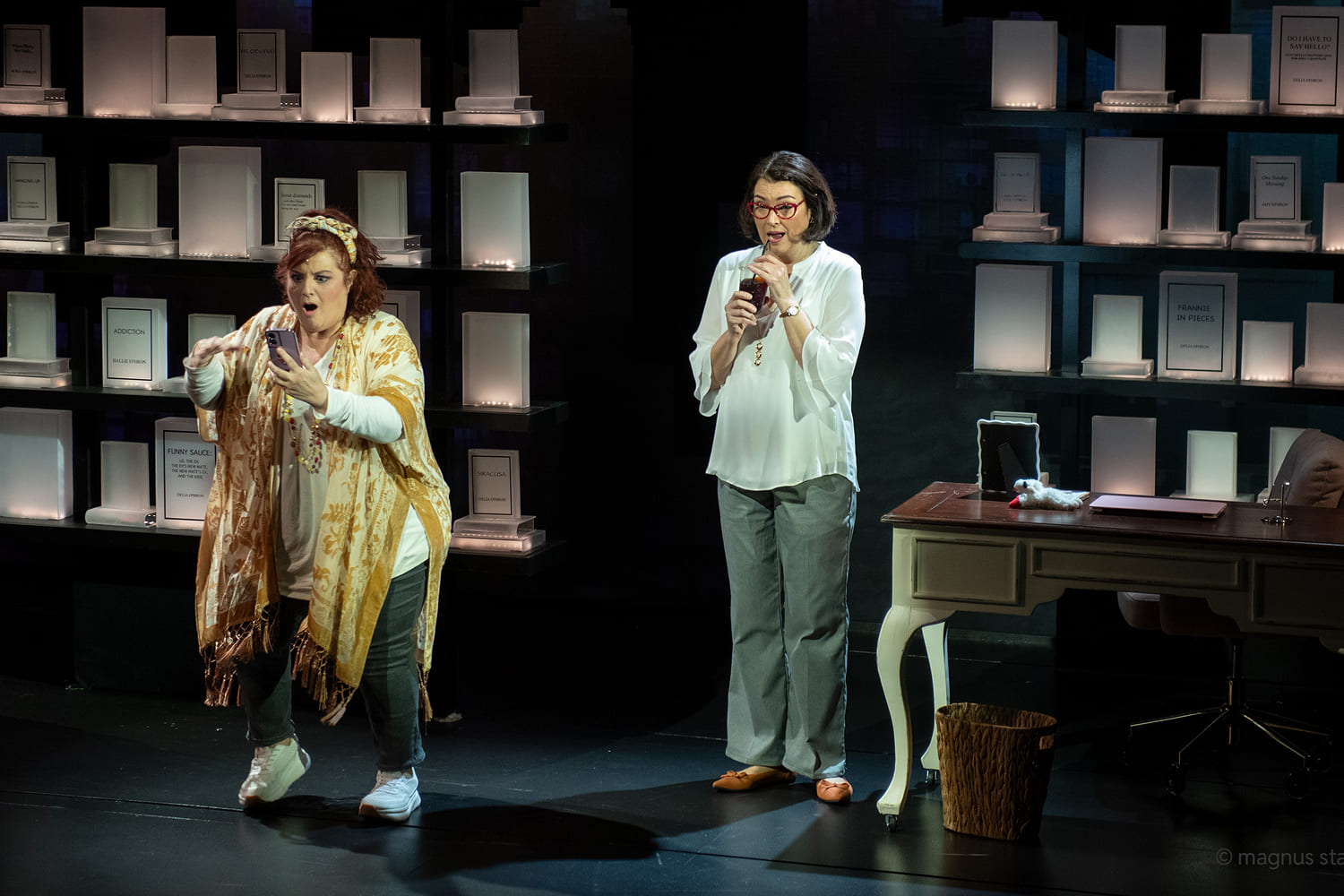
Margot Moreland and Dalia Aleman in GableStage's "Left on Tenth." (Photo by Magnus Stark Photography)
Soon after, we learn Ephron was invited to speak in front of a group of Jungian psychologists, despite her initial unfamiliarity with Carl Jung's work. The odds of an American psychiatrist reading her op-ed at this exact moment feel almost cinematic. Perhaps Rutter was Ephron's “Bashert”-a Yiddish term meaning soulmate, especially in a predestined marriage. Ephron explains the term in the play.
Yet the focus of the play isn't Jungian theory, death, or illness-it's people (and dogs). GableStage has assembled a first-rate cast that delivers believable, nuanced performances that endear us to these characters.
Aleman is graceful and impressively natural in each role. With neck-length dark hair and red-rimmed glasses, she imbues Ephron with modesty, affection, and charm. She never hints that grave moments are coming. Instead, she transitions seamlessly through sadness, shock, hope, and relief. When her voice breaks, real tears seem imminent. We care because Aleman makes Ephron likable from the start.
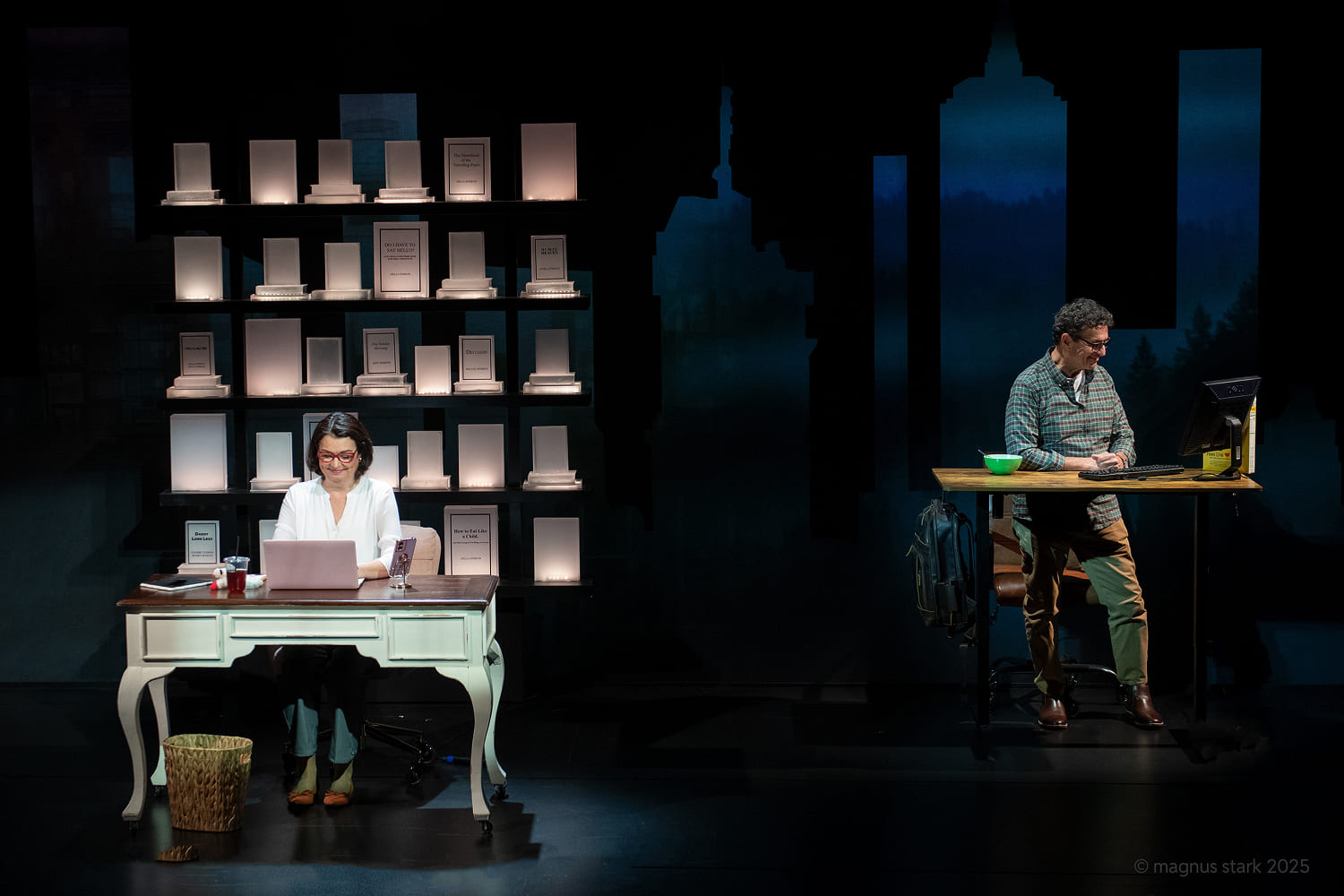
Dalia Aleman as Delia Ephron and Stephen Schnetzer as Peter. (Photo by Magnus Stark Photography)
Moreland plays multiple characters, including Ephron's doctor, Dr. Gail Roboz. “She was a doctor with a touch of girlfriend,” Ephron tells us. Moreland lends Roboz a motherly tenderness and personable demeanor that would make us all want her as a doctor. At one point, she leans into Ephron to convey care. Honesty is tempered with compassion.
Schnetzer matches Moreland's warmth. Speaking in a low, pleasant voice and radiating enthusiasm, he is smart but never arrogant. With dark curls, concern in his eyes, and costume-appropriate attire (thanks to Lorena Lopez), Schnetzer portrays the suitor we all hope to meet. Peter's compassion for Delia is always evident.
Aleman and Schnetzer demonstrate strong chemistry. Their intimate scenes are believable, including a long kiss. Intimacy coordinator Jeni Hacker ensures even newly acquainted characters feel like a couple married for decades.
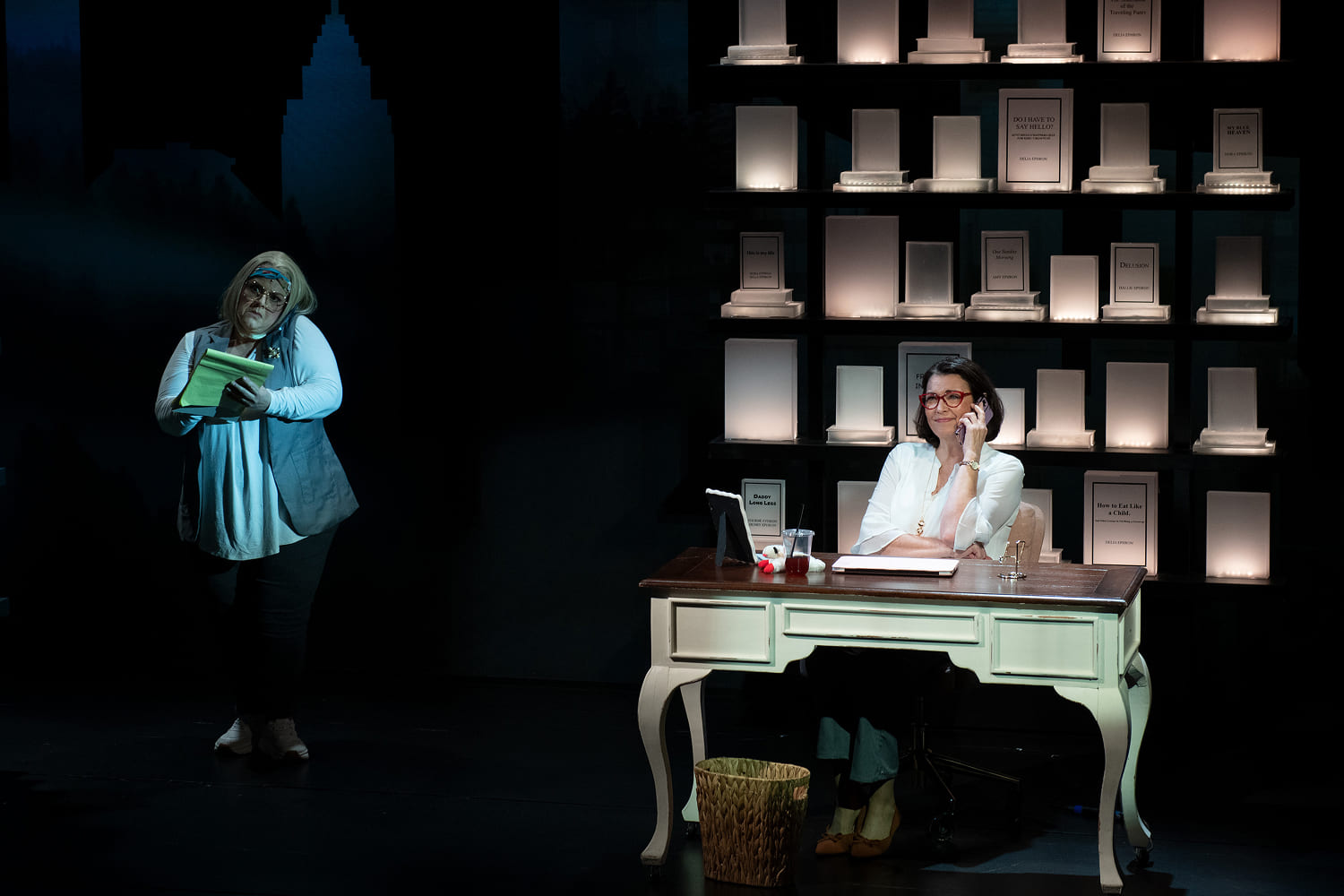
Margot Moreland and Dalia Aleman in GableStage's "Left on Tenth." (Photo by Magnus Stark Photography)
The actors perform on Frank J. Oliva's striking, realistic set. Detailed but never overcrowded, it features shelves of books written by Ephron and her sister Nora, who died in 2012 from the same disease Delia survived. The set remains largely static, but shelves move automatically to suggest various locales. It can be difficult to discern where Oliva's design ends and Jamie Godwin's projections begin, which include an artful depiction of the New York City skyline-the title references Ephron's Greenwich Village home.
In the final analysis, "Left on Tenth" is a bittersweet but heartwarming adaptation that encourages us to live fully in each moment, with humor, grace, and companionship. The production reminds us that, even amid loss and illness, life's small moments of love, humor, and connection are what endure.
IF YOU GO
WHAT: "Left on Tenth," by Delia Ephron.
WHEN: Wednesday, Thursday, Friday and Saturday; 2 p.m. Wednesday and Sunday. Special Saturday matinees on Nov. 29 And Dec. 20. Through Dec. 21.
WHERE: Wolfson Family Theatre at GableStage, 1200 Anastasia Ave. in Coral Gables.
TICKETS: $60 to $95.
INFORMATION: (305) 445-1119 or www.gablestage.org.




